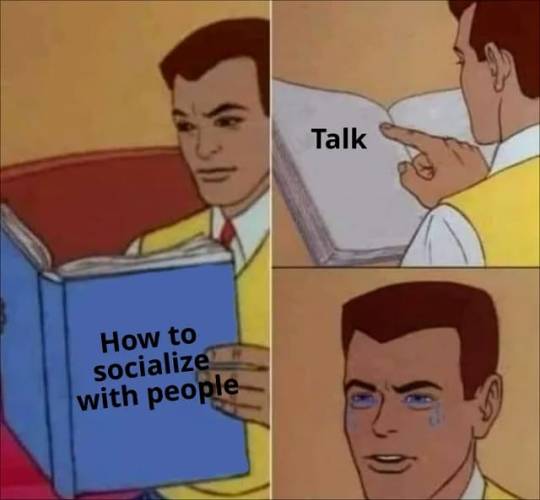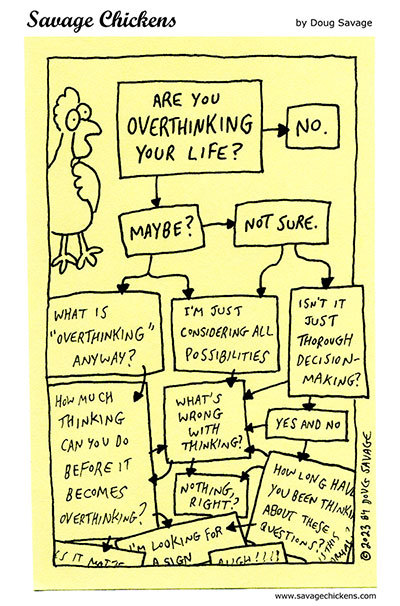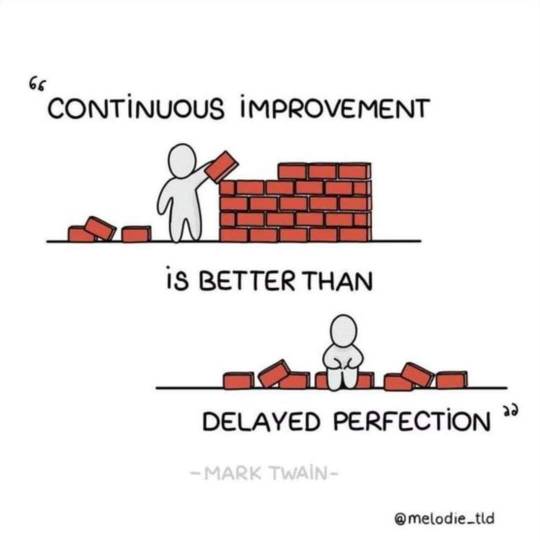Text


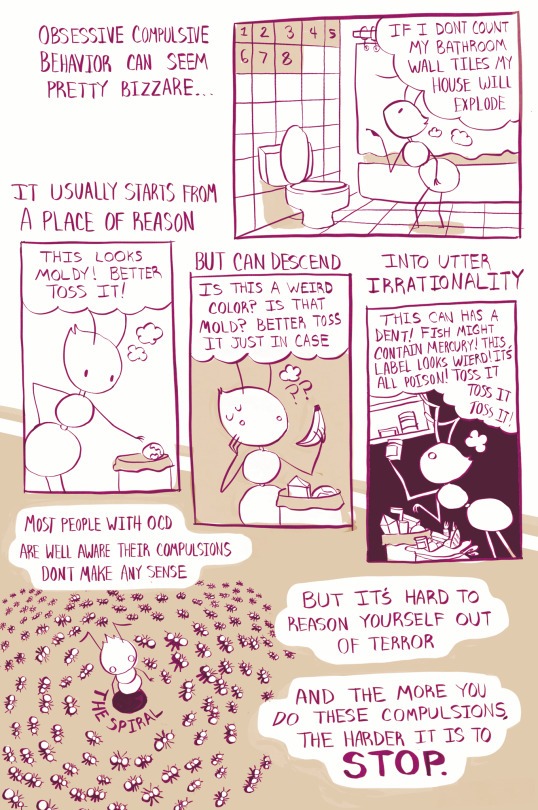
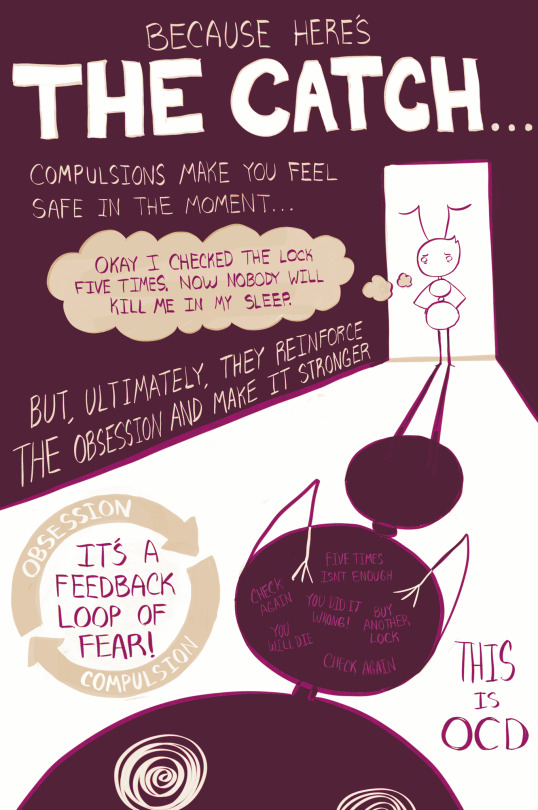

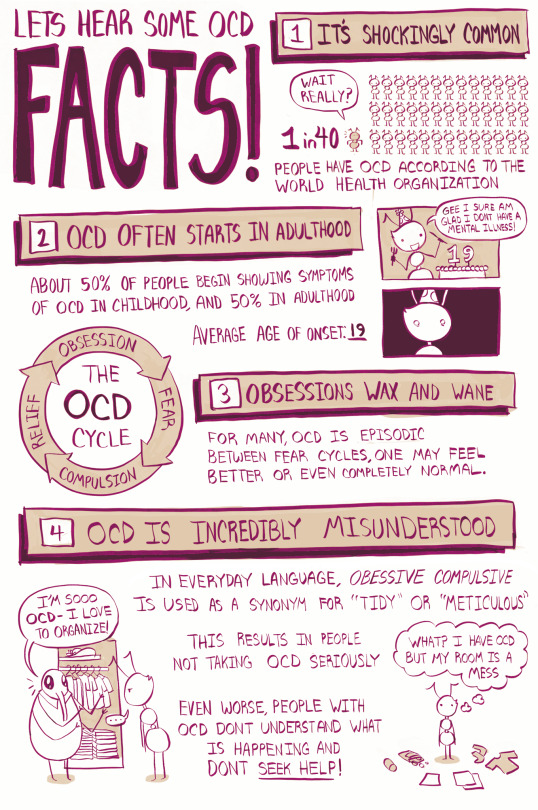
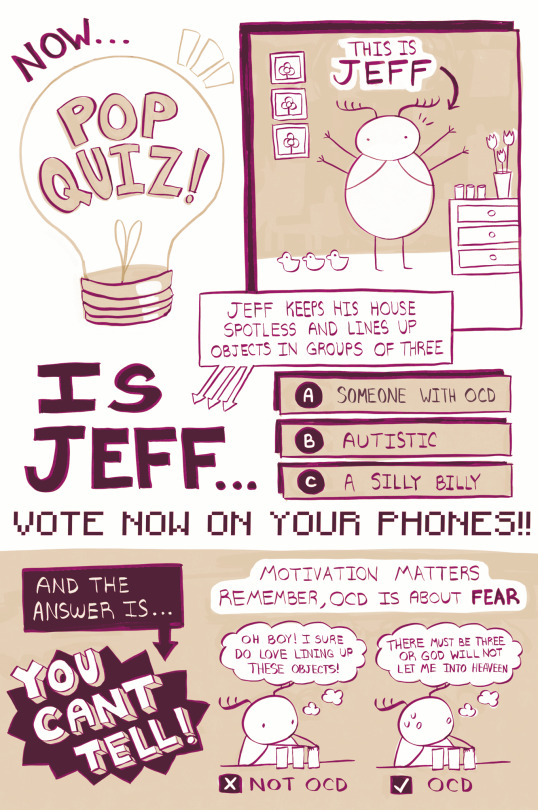


Greetings bugs and worms!
This comic is a little different than what I usually do but I worked real hard on it—Maybe I'll make more infographic stuff in the future this ended up being fun. Hope you learned something new :)
If you are still curious and want to learn more about OCD, you can visit the International OCD Foundation's website. I also recommend this amazing TED ED video "Starving The Monster", which was my first introduction to the disorder and this video by John Green about his own experience with OCD.
The IOCDF's website can also help you find support groups, therapy, and has lots of online guides and resources as well if you or a loved one is struggling with the disorder. It is very comprehensive!
Reblog to teach your followers about OCD
(But also not reblogging doesn't make you evil, silly goose)
48K notes
·
View notes
Text
Watching my adult acquaintances have the same uncomfortable realizations I had at 12-ish because of my anxiety disorder:

100 notes
·
View notes
Text
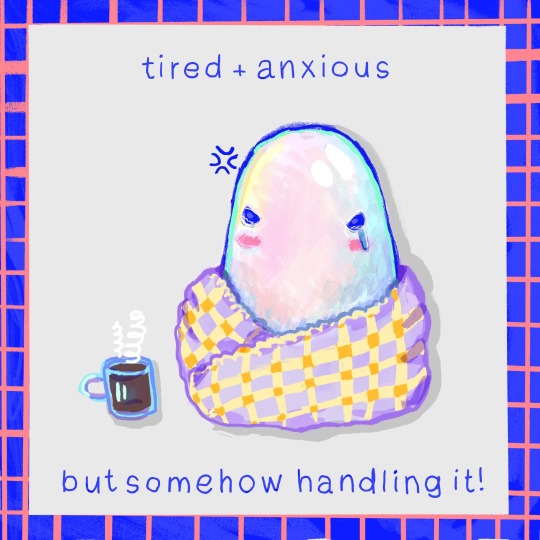
A tired and anxious little blushing ghostie <3
341 notes
·
View notes
Text
Important rules/tips I've learned as an adult that helped with anxiety
If people are mad at you, it's their responsibility to tell you, not your responsibility to guess
If they're mad at you in secret anyways, they're the ones in the wrong, not you
If people don't like what you're doing, it's their responsibility to tell you
If they say it's fine when it's really not, they're the ones in the wrong, not you
People are allowed to be wrong about you
If they are wrong about you, wait for them to bring it up, because if you try to, you will inevitably overcorrect
Some people are committed to misunderstanding you. You will not win arguments against them. Yes, even if you explain your point of view. They do not care. Drop it
The worst thing that will happen from a first-time offense is being told not to do it again. Maybe with a replacement if you broke something
You can improve relationships and gauge willingness to talk to you by giving compliments. It's like a daily log-in bonus and nobody thinks twice about it
Most things are better after you sleep on them
Most things are better after you have a meal
Most things are better after you shower
Your brain makes up consequences that are irrational. If the worst DOES come to pass and someone acts like they do in your head, they are overreacting, and you are entitled to say "what the fuck"
If your chest hurts after you feel like you've made a social error, that's called rejection-sensitive dysphoria. It means your anxiety is so bad that it's causing you physical pain, which is a good indicator that you're overreacting. Tense yourself, hold it for 20 seconds, let it go, then find a distraction
If you're suddenly angry at someone after you feel like you made a social error, that's also rejection-sensitive dysphoria. You are going to feel annoyed about it for awhile, but being genuinely pissed off is your anxiety trying to find something to blame to take the responsibility off your shoulders, and getting scared because it can't justify itself. Deep breaths, ask yourself how much you ACTUALLY want to be angry at that person, then find a distraction
"Sour grapes" is more healthy for you than stewing. Deciding you don't like someone who's perpetually annoyed with you, won't talk to you, etc. makes letting go of anxiety over them easier
If people don't like you, they will find reasons to be annoyed with you when they otherwise wouldn't. If people do like you, they will find reasons NOT to be annoyed with you when they otherwise would. People do not ping-pong between the two
You DO have to make a conscious choice not to think about something. If you're having trouble circling back to it, say out loud that you're done thinking about it and why. Then find a distraction
When you're upset, part of you is going to want to make false bids for attention (suddenly texting differently, heavy sighs, etc. but when someone asks you about it, you tell them it's nothing). Do not listen to it. You gain nothing from it except more misery
People like to help people they care about. It makes them feel good about themselves
If you think you're insufferable for needing help, see above. Yes, really. They get a serotonin kick from it
If you think you're insufferable for mannerisms you have, you either have to consciously choose not to do them, or accept that they're part of the package that comes with you. Being apologetic about existing does nothing except make you more miserable
If you do things you don't like when you feel meh about it, it makes it easier to do them when you hate it
If you avoid things you don't like when you feel meh about it, it reinforces and magnifies how bad it feels when you hate it
Seriously. Read those last two points again. If you can make yourself make a phone call when you've got nothing to lose, you will slowly lose that panic you get when you have to make a phone call you haven't prepared for. You do have to CONSCIOUSLY take that step
Hobbies that make you care for something get rid of that nagging feeling that you're not doing enough. Go grow some rosemary
If you don't engage with your hobbies regularly, you will feel miserable, and anxiety will spike
Hobbies are things that give you a bit of happiness. They do not have to be organized or named to do that. Go be creative in something. Play with coins. Make up lists. Start a new WIP
No one cares what you look like
If people point out things they don't like about how you look unprompted, they are being rude. You are entitled to say "what the fuck"
People who like you will find you pretty to some degree. Minor things about your appearance go completely unnoticed. Literally, scars and dots and blemishes do not register to someone who likes your company
You looking at yourself in the mirror is 10x more closely than anyone is going to look at you
If you're anxious about your body type, and you're creatively inclined, make/write an oc with that same shape. Give them nice things and make other characters love them. Put them on adventures. You'll start to see yourself in the mirror more kindly
You care about wording and perfect lines/colors way more than anyone who views your work ever will
Sometimes when you're upset, you're going to feel like not eating. Do not do that. Not eating makes you more miserable
Same with things you normally enjoy. Denying yourself helps no one. You are punishing yourself for being sad. Stop it
Both of these will take conscious decision to break the habit of. Make yourself do it anyways, and it will slowly get easier
And again, to reiterate: If someone is mad at you, it is THEIR responsibility to tell you, not your responsibility to guess
45K notes
·
View notes
Text
again, if you find yourself continuously drawn to internet discourse and engaging with it to the point it's hard think about anything else
read about moral ocd or ask a professional about it. i promise that is not normal or "just being chronically online". there are treatments and experts who can help navigate your obsessive tendencies
it's gonna be alright. having the most correct discourse opinions says nothing about you as a person. you're gonna be ok
14K notes
·
View notes
Text
you're not bad at talking to people just because you struggled to talk to one person or group. no social interaction is ever the same as the last. no man ever steps in the same river twice, for it's not the same river and he's not the same man, as Heraclitus said.
your ability to converse varies greatly depending on the company you have, location, etc. and sometimes even with the same people (your first impression doesn't have to be your last impression). you can go from struggling one day to having a much easier time another day due to the new topics that get brought up or activities you do, as well as other various factors of your mental health improving and gaining experiences, things you might not notice from the inside, like your ability to communicate clearly or your body language.
the only "failed" social interaction is one where you didn't learn any information - a "hi how are you?" "I'm alright" counts as information, you learn what their mood is or how they want to present themselves - and even though the encounter might have been excruciating, it helps your future self, so your efforts meant something.
#social anxiety#anxiety#social interaction#social skills#actuallymentallyill#actuallyanxious#mental health#advice#mental illness
2 notes
·
View notes
Text
How to Have Better Conversations
I’m writing this at the request of my partner. She shared she’s really been struggling with making conversation more than usual lately. I shared some thoughts on how I navigate conversations she found useful and asked if I’d be willing to make a resource or write more about it. This is not meant to be a definitive expert guide, it’s built from my observations and experiences as someone who is autistic and has to navigate a lot of social situations completely manually. This is how I break down the individual components of conversation.
When I spelled this all out, one of her takeaways was that conversations actually involve a lot of microdecisions and that’s why they can be so tiring. And I think that’s totally correct. But I think it’s also why some people can thrive with them because it’s actually a lot of difficult decisions that are tricky to pull off well so when you can and do, there’s a real sense of accomplishment that can make talking more appealing.
I have a feeling this post will be overcomplicated and convoluted to a lot of folks but maybe there’s a handful of folks for whom it is helpful. Take what works, leave the rest. Summary at the end.
Types of Conversation
Topics of conversation are decently important in my experience. They ultimately let you know where the conversation will go - whether it’s likely to end in a dead end, what sorts of things it will allow you to learn about the person you’re discussing with. In my experience, just about all conversation topics fall into one of four camps.
While I talk about Best Use and Don’t Use here - most conversation in the following topics will fall somewhere in-between. They’re just sign posts, not rules.
Me
The focus is on you. Me topics are ultimately about telling a story about yourself with some amount of conscious intent.
Best Use
The best use of this is setting expectations and conveying preferences. This allows your talking about yourself to serve a purpose that ultimately assists the other person in knowing how to understand and interact with you best without necessarily demanding certain treatment front. They might change or not change how they interact with you and this can show how responsive you might expect them to be.
Examples:
“I’m a writer so I don’t work 9-5. If I reply at odd times, that’s probably what’s going on.”
“One of my favorite ways to get to know someone is to grab a hot drink and go for a walk with them.”
Don’t Use
The worst use of this is look a certain way - knowledgeable, impressive, interesting. Basically any use rooted in getting another person to like you. Genuine connection doesn’t start from a place of elevating one person over another. Plus honestly 90% of people just do not care about why you think you’re interesting, important, etc and hate feeling pressured to validate you.
Examples:
“My boss was even stumped by the issue but I figured it out on my own.”
“All my friends say I’m the best at baking.”
“I keep a bunch of tools in my car, I’m ready to fix anything anywhere.”
You
The focus is on the other person. You topics are ultimately about letting the other person share the story of themselves.
Best Use
The best use of You topics is to better understand how a person understands themselves. Open ended questions that invite them to show their thinking as well and shows you how they reason. The common acronym FORD (family, occupation/occupy time, recreation, dreams) is a decent
Example:
“So how did you find yourself in this city? What was that journey like?”
“Why did you take up [your hobby]? What drew you to it?”
Don’t Use
Don’t use you topics to actively try to find fault with someone else. It’s great to have standards and hard no’s for your friendships and relationships. But poking around for them upfront can alienate people who you’d otherwise like - suspicion is not a desirable quality in a friend or potential partner. Ultimately you have to let a person show you who they are and make a personal call. There’s no short cut.
Example:
“So why did you and your ex break up?”
“So you get angry easily then?”
Both
The focus is on a shared expertise/language, not on the story of either of you.
Best Use
The best use of both topics is to notice things about them they wouldn’t think to explicitly share necessarily and to connect in a way that only people with your shared interest or expertise allows.
Example:
My partner and I both have a background in academic medical research. However when we talk about it, it becomes apparent that my focus is on the practical and researcher side and hers is on the data and compliance side. It’s interesting to note where our similar interests compliment and diverge.
Don’t Use
Don’t use both topics to try one up or show you know more than the other person. The minute you do that the shared aspect - and therefore connection - is gone.
Example:
I once went on a date with a man who spent a half hour explaining how GIS systems work in a very “look at me” way after I mentioned I had used them when I was studying forestry in college. It was boring as hell.
Neither
The focus is on a topic without a shared expertise/language, not on the story of either of you.
Best Use
The best use of neither topics is a shared exploration/experience. One person will usually know a little more about a topic than the other person. The person who knows less benefits by learning about a topic they’re curious about. Their questions and observations invite the other to think about this topic in a new light so the experience winds up being somewhat shared.
Examples:
A woman in line at Lowes let me know I could overwinter mums in this area. I proceeded to ask her about how she’d taken such good care of hers and whether the effortwas worth it. She thoughtfully answered my questions and I learned a lot.
I mentioned to my partner a personal project I’m considering undertaking. She asks about my motivations for it and in doing so I have to further clarify them. She learned a little about what my project was about and I learned what I was really after, seeing it fresh.
Don’t Use
Don’t use neither topics to soapbox about things that are of solely personal interest. If someone makes it clear they’re not interested pivot to something more interesting. Even neither topics require at least a little bit of common ground.
Examples:
I regularly talk about group hypocrisies I’m trying to make sense of before realizing that people outside of that group don’t really care.
Ideal Ratio
In general, in reflecting on my own conversations, I think a ratio where more than half the conversation is on either both or neither topics are the most rewarding. It’s where neither party walks away feeling like they talked too much about themselves and when meaningful and interesting topics still have been discussed.
I think it’s a common mistake to try to get the conversation to be 50% you, 50% me. That’s where conversations feel like a job interview and get exhausting real quick. They also have an appearance of depth as people disclose more to keep the conversation going but with out a feeling of connection after because little time is spent on exploration and shared experience.
How to Respond
So knowing what topic you’re currently or want to talk about is one part of this, but the other is choosing a response. I generally let the other person’s response dictate some measure of my response.
Pivot
If someone seems negatively engaged - leaning back, looking around a lot, arms crossed, giving short answers - I pivot to a neutral topic. I find neutral topics work best because the focus is not on either of you - they don’t feel like they’re under pressure to disclose or act interested in you. Neutral topics also allow them to lead the pace - asking questions and making observations at the level they feel comfortable. If they continually seem negatively engaged, it’s usually best to bail from the conversation, especially if asking questions about the dynamic itself seems like it might not be welcome.
Matching
If someone seems neutrally engaged - mostly looking in your direction, not leaning toward or away, giving input on what you’re saying - I match and continue with the topic.
FOOL
Being a little like the Fool in the Major Arcana is actually a great way to be a good conversationalist - genuine, curious, brave, and receptive. Bellow are some concrete ways how.
Follow up questions - Good follow up questions come from a genuine place of curiousity. They also tend to either fill in gaps in your own understanding or encourage the speaker expand the discussion into a new but related area.
Observation - Observations on the topic itself are great but not your only option. You can oberve how a person seemed to feel when talking about the topic. You can observe that they’d touched on a related topic before. Comparison is a fruitful ground for observations as well - “That’s similar to…” and ”That’s very different than….”
Opinion - Offering an opinion or requesting their opinion is a good way to keep a conversation going. In general, it’s best to avoid generalizations, soften them a little to start with, and make sure there is some measure of compassion in the opinion you’re sharing. Rigidity leaves little room for discussion and exploration.
Levity - Where appropriate, make a joke, share a meme, craft a pun, tease them a little. Laughter is a shared experience that connects us.
Building
If someone seems positively engaged - leaning forward, making eye contact, coming closer to you for neurotypical people and actively engaging with the content of what you’re saying regardless of stims or eye contact for neurodivergent folks - I build on what we’re talking about. I self disclose my feelings and personal connections to the topic one step further than what the person I’m talking with has.
It’s important not to disclose a lot more than the person you’re talking with has. It leads to a vulnerability hangover for you and can be quite awkward and uncomfortable for them. If you disclose just a little more than the person you’re chatting with, then it’s much more easy to recover and match their level if they seem uncomfortable with what you shared.
Decision Tree
“What topic are we talking about currently?”
Me - Set expectations, share preferences; you focused
You - Understand you as you understand yourself; other person focused
Both - Connect over a shared language; idea focused
Neither - Connect over a shared exploration; idea focused
“What cues am I getting from the other person?”
If positive, build on current topic - be vulnerable
If neutral, match on current topic - be a FOOL*
If negative, pivot to a different topic - preferably neutral or in ratio**
*FOOL
Follow up questions - genuine curiousity - “I wonder…”
Observe - conversation, feelings, topic - “I noticed…”
Opinion - cautious, concise, compassionate - “I’ve often thought…”
Levity - make jokes, share memes - laughter connects
**Ratio
51% Both/Neither
<49% Me/You
295 notes
·
View notes
Text
spending more time hesitating/thinking about doing the thing than it would have taken to do the actual thing is social anxiety culture
24 notes
·
View notes
Text
There’s certain benign activities that you should do even if someone is judging you because the sort of person who would judge you for doing that isn’t a person worth listening to.
Worried about wearing that pikachu shirt when you usually don’t wear t-shirts? Do it. The sort of person who would judge you for wearing a pikachu shirt isn’t worth your time.
Worried someone will judge you for eating in public? What sort of idiot cares about another person eating a salad at the park? Just do it.
Worried you’re not dressed well enough for this mall? It’s a mall. If someone judged you for showing up in basketball shorts they have too much time on their hands.
21K notes
·
View notes
Text
You can’t let intrusive thoughts “win” because there isn’t a fight to win. There is no fight. There is no danger to contain. The “fight” is punching yourself in the face and telling yourself that if you don’t do this, you’re going to accidentally act on something that terrifies you to your core. That’s the biggest reason why I hate that phrase so much. Not just because it creates misunderstandings and stigma in the minds of the unaffected, but also because it literally encourages the “O” in “OCD” for the affected. “Haha you gotta fight them! Fight it so much it ruins your life! You wouldn’t want them to win, do you?” Even when people are trying to dunk on how stupid that idea is, they still make jokes like “haha if I let my intrusive thoughts win I would be in jail” and it’s like…no you won’t. If you let your intrusive thoughts “win” nothing would happen because it’s just an unpleasant thought with no power. You let the intrusive thought wash over you, you let it “win” by letting it slither over your open palm, you say “that was weird”, and you continue with life. You don’t put it under a microscope. You don’t clench onto it trying to kill it, you just let it go. And then it’s fine.
12K notes
·
View notes
Text
apparently April is Stress Awareness Month. mm boy am I already so so aware
17 notes
·
View notes

